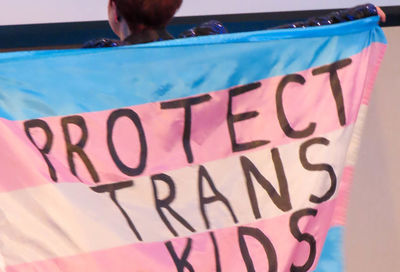‘American Fiction’ Mixes Sharp Satire with Maudlin Family Drama
"American Fiction" undermines its comic momentum by shifting between biting literary satire and maudlin family drama.

A decade ago, Cord Jefferson was one of the most captivating writers at Gawker, the then-flourishing news and gossip blog. In 2014, during the early Black Lives Matter movement, he wrote an essay called “The Racism Beat,” which described the exhaustion he and other Black writers felt at being expected to chronicle every viral news incident involving racism.
“If America would like to express that it truly values and appreciates the voices of its minorities, it will listen to all their stories,” he argued, “not just the ones reacting to its shortcomings and brutality.”
Jefferson has since left journalism for television writing, but he remains fascinated by the ways Black writers are expected to perform their trauma for white audiences. It’s at the core of American Fiction, his directorial debut as a filmmaker. Adapted by Jefferson from Percival Everett’s novel “Erasure,” it’s a barbed yet uneven satire, at its best when it bitterly skewers the indignities and microaggressions of the modern publishing industry.
It’s an industry that has left Thelonious “Monk” Ellison, a middling novelist and writing professor, fed up. Though he’s published several novels of niche acclaim, Monk (played by Jeffrey Wright, with a mix of withering contempt and flashes of tenderness) is disillusioned with the popularity of stereotypical “Black trauma porn” and struggling to sell his latest work, a retelling of an ancient Greek work by Aeschylus.
Publishers “want a Black book,” his exasperated but loyal agent (John Ortiz) informs him. Monk is incensed: “They have a Black book. I’m Black, and it’s my book.”
Like Billy Crystal in Throw Momma from the Train, Monk is also tormented by the success of a bestselling female novelist. Her name is Sintara Golden, and her latest book, “We’s Lives in Da Ghetto,” represents every literary trend he hates. At a book festival, Monk leaves his own sparsely attended panel and watches with silent contempt as Sintara reads from the book to a rapturous crowd.
At the end of his rope, Monk decides to have his revenge. He pens a scathing satire of acclaimed Black literature: an incoherent mishmash of street dialect and poverty clichés, with a “dumb melodramatic sob story” for good measure. In one of Jefferson’s more inspired flourishes, the thug-like characters appear as apparitions in Monk’s study, awaiting his page directions.
The agent reluctantly agrees to send the manuscript — titled “My Pafology” and credited to Stagg R. Leigh (get it?), Monk’s pseudonym of choice — to a few publishers. In a delicious twist reminiscent of The Producers, Monk’s attempt to write a pandering, hacky book becomes a major success. When his agent tells him that a publisher is offering a $750,000 advance, Monk is more appalled than pleased. “It’s the most lucrative joke you’ve ever told,” the agent says.

Monk is disgusted by the book’s popular appeal, but he needs the money — his mother has been diagnosed with early-stage Alzheimer’s, requiring expensive care — and so takes the deal. Concealing his identity, he bamboozles the publisher, and later the general public, into believing that “My Pafology” (which he renames “Fuck” in a last-ditch effort to sabotage his own scheme) is the literary debut of a pseudonymous fugitive on the run from the law.
In very funny scenes that evoke the surrealist racial satire of Boots Riley’s Sorry to Bother You, Jeffrey Wright plays a Black man doing an impression of how the white literary class expects a Black man to speak. It’s like a one-man minstrel show.
American Fiction also shrewdly lampoons the empty, performative language of liberal white allyship. “I am thrilled to read a BIPOC man harmed by the carceral state,” exclaims a white writer serving on the committee tasked with choosing the winner of a literary prize for which “Fuck” is nominated.
And yet, frustratingly, the film frequently undermines its own comic momentum by shifting from literary satire to maudlin family drama. While becoming an undercover literary sensation, Monk is also navigating a grabbag of family woes — mom has Alzheimer’s, brother’s wife left him when she caught him with a man — and also falling in love with a new girlfriend (Erika Alexander).
The domestic comedy-drama falls into a more formulaic rhythm and, though there are amusing one-liners, it lacks the spiky, comical bite of the book-world skewering. It gives the impression that Jefferson didn’t quite trust the central satire to carry the movie and overcompensated with side plots that dilute the film’s impact.
At times, American Fiction also lacks a clear sense of time and place. The film was written in the early 2020s from a novel published in 2001. The onscreen presence of iPhones suggests we’re in present-day. So do lines like “I just think it’s essential to listen to Black voices right now,” which evoke the mainstreaming of allyship politics during and after 2020.
Yet the film scarcely acknowledges the real-life political backdrop of the era — be it Black Lives Matter uprisings or the Trump-driven rise of white nationalist politics — and wants us to believe that the voting process of a meagerly paid book-prize committee would happen in person these days rather than over Zoom.
It also strains disbelief that, after the “A Million Little Pieces” debacle, Monk could pull the wool over the eyes of the literary world with his fugitive story. In our extremely online era, wouldn’t a website like, well, Gawker investigate the whole hoax? Then again, it’s 2023 and George Santos managed to get away with his own elaborate fabrications long enough to serve a year in Congress. What if that was all a social satire, too?
Santos understood what Monk gradually learns: You can never lose by underestimating the intelligence of the American public.
American Fiction (★★★☆☆) is now playing in theaters nationwide. Visit www.fandango.com.
Support Metro Weekly’s Journalism
These are challenging times for news organizations. And yet it’s crucial we stay active and provide vital resources and information to both our local readers and the world. So won’t you please take a moment and consider supporting Metro Weekly with a membership? For as little as $5 a month, you can help ensure Metro Weekly magazine and MetroWeekly.com remain free, viable resources as we provide the best, most diverse, culturally-resonant LGBTQ coverage in both the D.C. region and around the world. Memberships come with exclusive perks and discounts, your own personal digital delivery of each week’s magazine (and an archive), access to our Member's Lounge when it launches this fall, and exclusive members-only items like Metro Weekly Membership Mugs and Tote Bags! Check out all our membership levels here and please join us today!
























You must be logged in to post a comment.